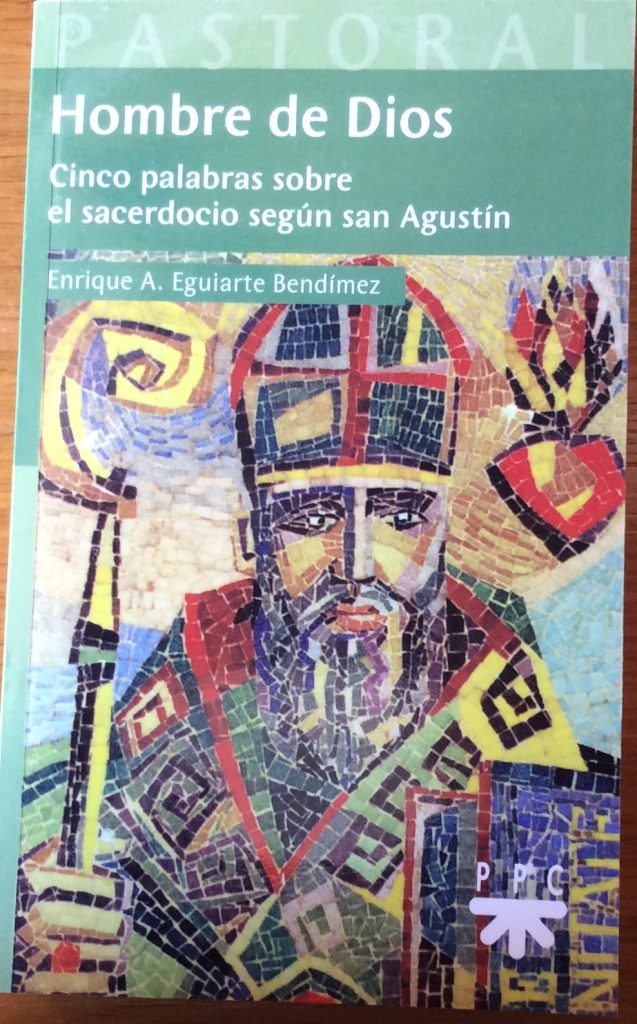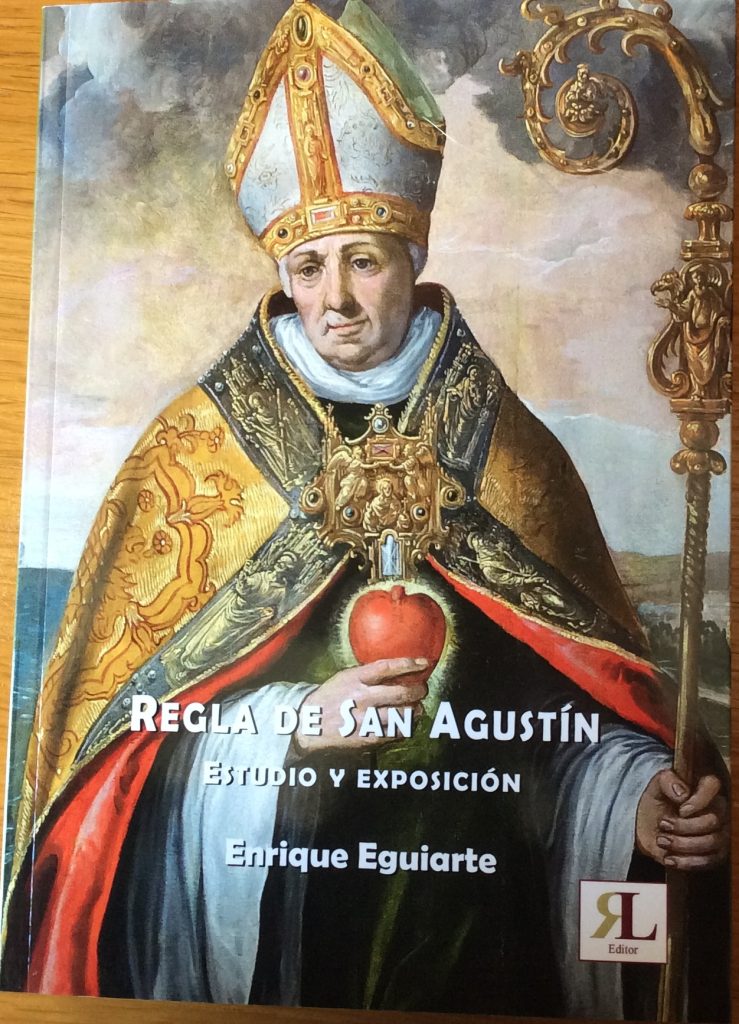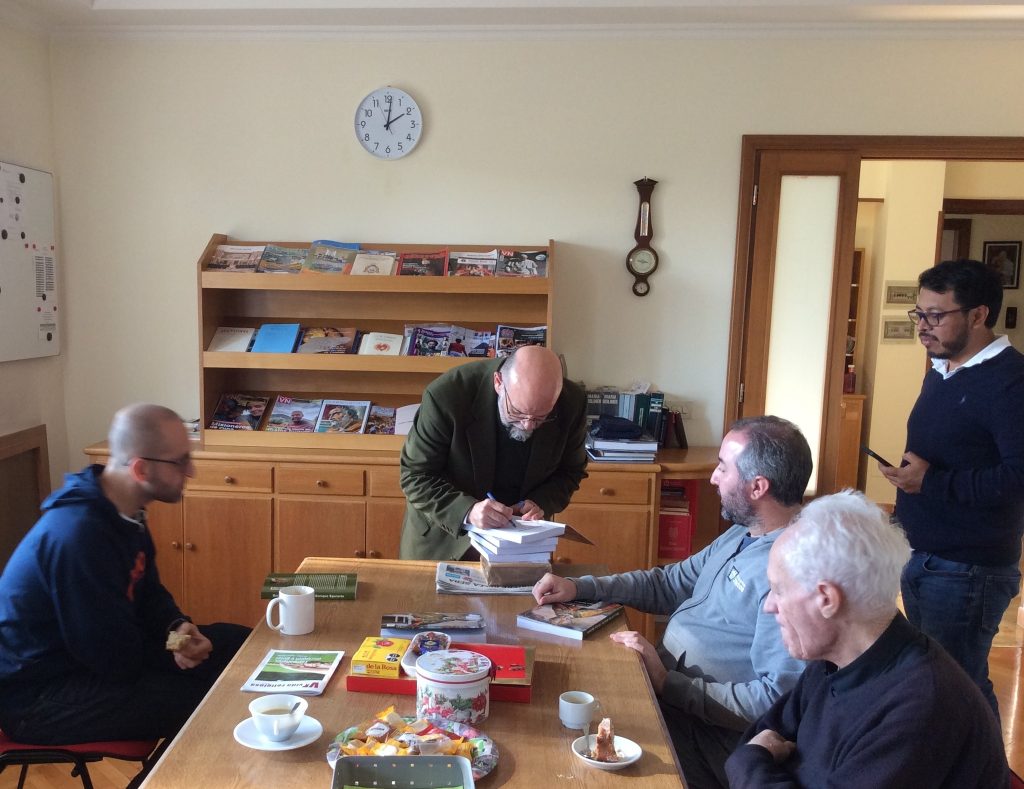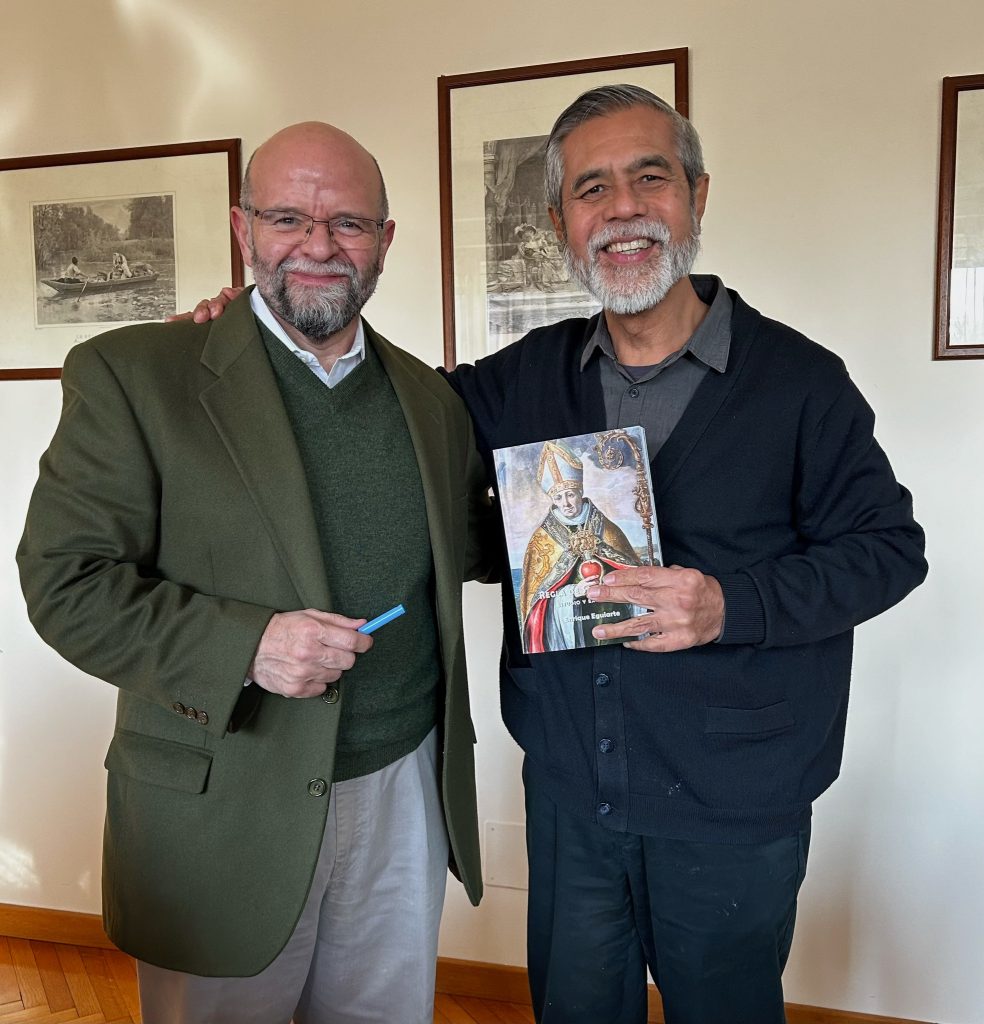Pastor in the style of Augustine
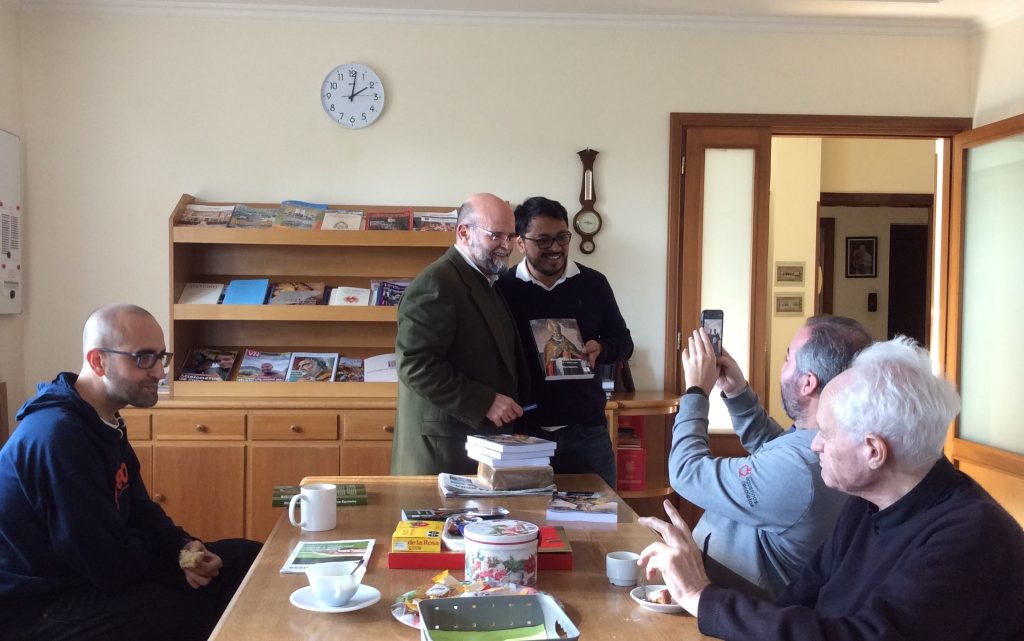
Interview with Fr. Enrique Eguiarte, OAR
31 January 2024
Rome, Italy
It’s still dark, with near zero temperature. His head warmed in a bonnet and hands in mittens, he hauls in the day’s newspaper and emptied garbage bin before going out again for his daily jog, a practice that goes back decades. Sometimes I meet him in the circuit, I being the new kid on the block.
With the same discipline and consistency, Fr. Enrique Eguiarte has produced books, mostly on St. Augustine, nearing 40 in number, he cannot remember exactly right off the bat. In this last month his two latest books have arrived from the publishing house: “Hombre de Dios. Cinco palabras sobre el sacerdocio según San Agustín” (Man of God. Five Words on Priesthood, according to Saint Augustine) and “Regla de San Agustín. Estudio y Exposición” (Rule of Saint Augustine. Study and Explanation”).
With a doctorate in Philosophy and Letters with the Universidad de Navarra, Spain (1999) and another in Theology and Patristic Studies with the Institutum Patristicum Augustinianum of Rome (2010), fray Enrique juggles writing and research with teaching at the Patristicum, and the Regina Apostolorum, both in Rome, and the Pontifical University of Mexico, as well as heading the OAR Institute of Augustinology and serving as director of the reviews Mayeutica and Augustinus.
He still finds time to exchange a celebratory swig or two of his favorite brandy with this interviewer. However, it is not necessarily under its influence that the following interview was conducted:
- How do you come up with an idea on which to write about in a book? Can you briefly tell us about the original idea that led to the writing of your two latest books?
The inspiration for writing a book comes at times like an illumination. I have experienced some times that I have an idea and that in that very moment I can see the argument and all the parts of the book in a very clear way. That is the moment to sit down and write those ideas. Once the illumination is passed, if I have not completed the list of arguments or the secondary ideas of the Book, I just cannot complete them…
Some other times, like the case of this book about the priesthood, the idea came from the Augustinian friars in Perú. I was invited to preach a retreat to them, and I prepared a certain topic. When I started the retreat the Provincial told me that they had a deacon who was preparing for the priestly ordination, and he asked me to give him some especial talks, apart from those addressed to all, so that he may be prepared to be ordained. So I thought of choosing five words that could summarize some of Augustine’s ideas about priesthood. When that retreat was finished I kept all the notes I had from the short talks I gave to the deacon, and with those notes I began to write the Book, adding of course many other ideas and things.
- Why five words of Augustine on priesthood, and not more or less? Which words are these? Can you briefly describe each word?
Well, as I told you, I chose five words because of the structure of the spiritual retreat of five days. Certainly, we can find a wider group of words to talk about priesthood in Augustine, but this was the reason of choosing five words.
These words are: Gift, Service. Communion, Configuration with Christ, Holiness.
a. Gift. I develop the idea of the vocation and how to be called and chosen by the Lord to become a priest is something extraordinary. None of the angels despite their holiness has received this gift, and I think they remain surprised to contemplate how human beings despite their sinfulness and fragility are called to be priest, to be able to perform the sacraments in the name of Christ. So this first chapter is an invitation to all priest, and to all the believers to consider how great is the vocation to become a priest. I think that if the young people consider what I propose in this chapter, we will have big queues in all the Seminaries of the World…
b. Service: The priest as Christ should not search to be served but to serve. The image I propose in this chapter is the one of Christ washing the feet of the Apostles. The priest receives the ordination not only for himself but mainly for serving the People of God. He should always remember that he is only a servant, not a Master or the Owner of the Sacraments. He is a humble servant. This chapter invites to avoid pride, and the search of power or money. The priest has received a great gift in order to serve with humility the People of God.
c. Communion. I develop this idea in a twofold manner. First the priest should live his life in communion with the whole Church, remembering that he was chosen to serve the whole Church, the universal church and to live united to all the Church, praying for all the members of the Church and in the awareness that the Church is more of what he can see. There is a heavenly Church also, to which he should feel united when he celebrates the sacred mysteries. The priest should be the apostle of unity and reconciliation wherever he is. And in a second sense. Communion, as the Eucharist. The priest is particularly linked to this blessed sacrament. So I make an invitation to all the priests to celebrate the Mass with devotion and awareness of what they are doing, and also to live an Eucharistic life. Which means to have the Eucharist as the center of their lives, and to live giving thanks to the Lord for all he has given to them.
d. Configuration with Christ. In this chapter I develop the idea that the priest should imitate Christ since he is performing the sacraments and is celebrating as it is said in Latin, “in persona Christi”, taking the place of Christ. I make an invitation to prayer and to grow in the love and friendship with Christ as an essential part of the Priestly life. The more the priest imitates Christ, the more his actions and words will be close to God.
e. Holiness. In this chapter I recognize that all Christians are called to reach holiness which is the perfection of love in their own lives. But I stress that priest are called in an special way to be holy, since they are dealing with the things of the Lord the whole day. They have more at hand all the means to reach holiness. Nevertheless, there is always the danger of the routine and that the priest could become only an “employee of the Lord”, and not really a person which is living with all his heart what he is doing.
- Several commentaries have been written on the Rule of St Augustine: what need did you see in writing another one? What novelty do you offer in this book?
Talking about my Commentary on the Rule Yes, we have plenty commentaries on the Rule, some of them excellent. Nevertheless, I found three types of commentaries. First of all, the Academic commentaries, only for Scholars. A second kind, abstract commentaries. I mean commentaries made without an order and developing a group of ideas without any linking among these ideas. A third type, commentaries which presented only other texts of St. Augustine with which the authors pretend to explain what St. Augustine said in the Rule. The reader in this case gets bored of reading a lot of texts of St. Augustine without understanding their meaning an application nowadays. My book tries to make a very specific and concrete commentary of each of the points of the Rule. Of course, I quote another text of St. Augustine, but I have put these texts in the footnotes, so that the person who reads does not lose the idea I am trying to explain. I try to make the reader aware of two things. First, the world and customs of the people to whom St. Augustine was writing the Rule. Because we have the danger of reading the Rule in a contemporary manner, and we forget that people in St. Augustine’s time didn’t have electric light, computers, water in their houses, and they lived in a pre-capitalistic society. For example, when St. Augustine in Chapter 4.11, talks about the letters that some women may write to a monk, we immediately think that a woman took a pen and paper and wrote a love letter to the monk. We forget that in St. Augustine’s, only the 15% of the population knew how to read and write. And from this 15% maybe only the 2% were women… Also, there was no paper, the paper didn’t exist in his times, only the papyrus and parchment…, and no pens, only ink made of charcoal and other things and the feathers to write… The great sin that St. Augustine is presenting in the Rule is that the woman who wanted to send a letter to a monk had to spend a lot of money and also search for a person to write the letter. So, the affair among the woman and the monk became a public thing, since the one writing the letter could expand the news about the topic of the letter and the affection among the woman and the monk… So, in my book I stress all these things so that the reader could understand the meaning. And also, I explain what the points of the Rule meant for the original addressee but also, I try to explain which is the meaning for us today and why the Rule, despite it was written more than 1,600 years ago, is still actual and we can still live its spirituality.
- Your prolific book production remains unabated. What keeps you going? Do you experience writer’s block; if so, how do/did you overcome it?
I liked writing since I was a child. I can remember when I was a child that I loved to play with my soldiers and with my “Match Box” metal cars with my brothers and friends, but together with that I spent many hours laying on the marble ground of my parent’s house, in front of a big window, writing in my notebook stories and adventures and short novels…
I really do not experience writer’s block. I have a secret notebook where I write all the ideas of the new Books I would like to write. As I told you when inspiration comes, I write down all the project of the Book. And it remains in the secret Notebook, until the moment has come to develop that idea. In fact, I don’t lack ideas, I do lack time… That is one of the things that I ask daily to the Lord, to give me time…
- Any other book project in the offing?
Yes, in this moment I am writing two books at a time (this is another secret if you always write two books, you develop more one and when you finish that one, you have another already started to continue writing…)
The topic of the Book, which is number one, is about learning to grow old, and ten ideas of St. Augustine of how to live the last part of our life. The topic of the second book I prefer to keep it as a secret, when it is done and published, I will let you know…
